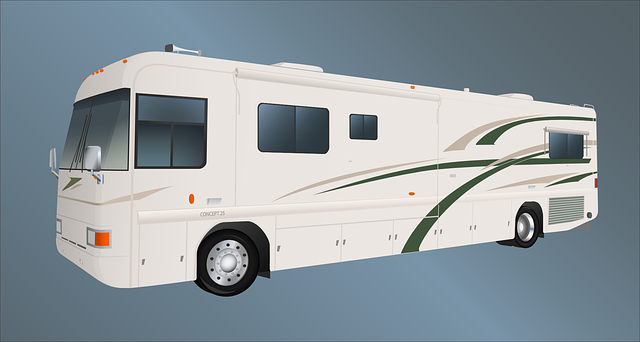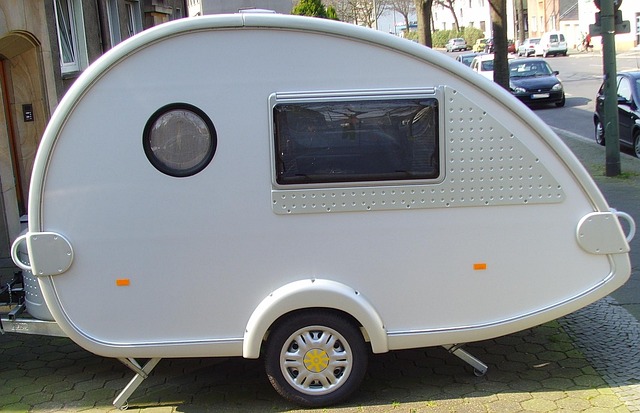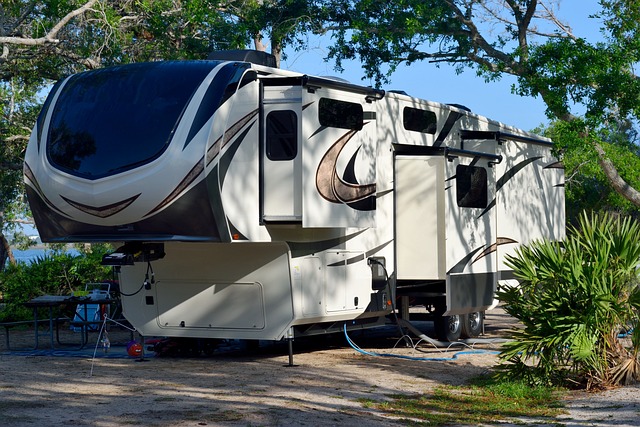When extending the life of RV batteries, it's crucial to understand the differences between lead-acid and lithium-ion types. Lead-acid batteries, including traditional and deep-cycle varieties, typically last 3 to 7 years, while lithium-ion batteries offer a longer service life of 8 to 10 years under ideal conditions, thanks to their higher energy density, lighter weight, and more charge cycles before significant performance degradation. Regular upkeep is vital for prolonging RV battery lifespan; this includes daily inspections, preventing unintended discharge, cleaning terminals, monitoring temperature, and occasionally fully discharging and recharging deep cycle batteries. Strategic charging that avoids deep discharges and extreme temperatures, coupled with the use of solar panels, can significantly extend battery life. Energy-saving practices, such as using LED lighting and monitoring energy usage, should be adopted to minimize strain on the batteries. During seasonal storage, keeping batteries at a full or near-full state of charge in a cool, dry environment and utilizing a specialized battery maintainer can prevent sulfation and other temperature-related issues. Monitoring voltage and charge status regularly, conducting equalization charging as needed, and ensuring clean terminals are all key to maintaining optimal RV battery health for uninterrupted travel power.
Embarking on RV adventures requires thoughtful consideration of your power sources, with RV batteries playing a pivotal role in the journey. This article navigates through essential strategies and tips to maximize your RV battery life, ensuring your off-grid experiences are both sustainable and enjoyable. From grasping the nuances of different RV battery types and their natural lifespans to engaging in daily maintenance practices tailored for optimal performance, we’ll explore a comprehensive approach. Additionally, strategic charging techniques, energy-efficient living tips, and seasonal storage protocols will be discussed to extend your battery’s longevity. For those inclined towards hands-on solutions, troubleshooting and DIY repairs are also within reach, enhancing your RV battery management skills. Join us as we chart a path to prolonged power and uninterrupted exploration.
- Understanding RV Battery Types and Their Lifespans
- Daily Maintenance Practices for Optimal Battery Performance
- Strategic Charging Techniques to Prolong Battery Life
- Energy-Efficient RVing Tips to Reduce Battery Strain
- Seasonal Storage Considerations for RV Batteries
- Troubleshooting and DIY Repairs for RV Batteries
Understanding RV Battery Types and Their Lifespans

When it comes to extending the life of your RV batteries, a fundamental understanding of the different types and their inherent lifespans is crucial. There are primarily two types of batteries used in RVs: lead-acid and lithium-ion. Lead-acid batteries, which include traditional and deep-cycle varieties, have been the mainstay for RV power needs due to their reliability and cost-effectiveness. However, they typically offer a lifespan of about 3 to 7 years, depending on usage patterns, care, and maintenance. On the other hand, lithium-ion batteries are gaining popularity for their longer life expectancy, which can range from 8 to 10 years under optimal conditions. These advanced batteries boast a higher energy density, meaning they can provide more power over a longer period compared to traditional lead-acid options. Additionally, lithium-ion RV batteries are lighter and have a greater number of charge cycles before their capacity diminishes significantly. Understanding the differences in these battery types and their respective lifespans is key to making informed decisions about your RV’s power needs and maintenance routines, ultimately contributing to an extended battery life and uninterrupted adventure travel experiences. When selecting a battery, consider factors like depth of discharge, temperature tolerance, and the manufacturer’s warranty to ensure you’re investing in a product that aligns with your RV lifestyle and usage demands. Regular monitoring of battery health through state-of-charge indicators and maintaining proper charging practices will further support your batteries’ longevity.
Daily Maintenance Practices for Optimal Battery Performance

Regular maintenance is pivotal for maintaining the longevity and performance of RV batteries. To ensure optimal power output and longevity, it’s crucial to perform daily checks on various aspects of your RV battery system. Firstly, monitor the charge levels regularly using a reliable battery meter or monitoring system. This will help you keep track of how much energy is being used and replenished, allowing for proactive management of power consumption. Additionally, always disconnect the battery when the RV is parked for extended periods, as this prevents parasitic loads from draining the battery.
Secondly, regularly clean the terminals and cables with a wire brush to remove corrosion and ensure a secure connection. Use a mixture of baking soda and water to gently clean the battery terminals, and apply a coat of dielectric grease afterward to protect against future corrosion. Keeping the batteries charged at full capacity during periods of non-use can help maintain their charge memory. For deep cycle batteries, fully discharging and then recharging them periodically can also be beneficial for their health. Lastly, store the RV in a cool, dry place, as extreme temperatures can negatively affect battery life. By adhering to these daily maintenance practices, RV owners can significantly extend the life of their batteries and ensure they have reliable power whenever they hit the road.
Strategic Charging Techniques to Prolong Battery Life

When it comes to maintaining and extending the life of your RV batteries, strategic charging techniques play a pivotal role. To ensure the health and longevity of your RV battery, it’s crucial to follow proper charging practices. Deep discharging, which occurs when the battery is allowed to fully deplete, should be avoided as it can lead to sulfation, reducing the battery’s capacity over time. Instead, aim to keep the battery between 50% and 75% of its charge level during normal use. This ‘sweet spot’ prevents excessive strain on the battery and helps maintain optimal performance.
Another key strategy for prolonging your RV battery’s life is to avoid fast or erratic charging. Gradual, consistent charging is gentler on the battery’s internal chemistry. Invest in a quality charger that allows for a ‘recondensing’ or ‘restorative’ charge mode, which can rejuvenate the battery and counteract the effects of partial discharges. Additionally, employing solar panels can be an environmentally friendly method to maintain your RV battery’s charge level without overworking it with the vehicle’s alternator. Regular maintenance, such as checking electrolyte levels and ensuring clean terminals, also contributes to a longer lifespan for your RV battery. Remember to monitor your batteries’ condition regularly using a state-of-health (SOH) gauge or similar device to track performance metrics and intervene before issues arise. With these careful charging practices, your RV battery can serve you reliably for many adventures to come.
Energy-Efficient RVing Tips to Reduce Battery Strain

When embarking on an RV adventure, maintaining your vehicle’s energy efficiency is key to extending the lifespan of your RV batteries. To minimize strain on your RV battery and optimize its performance, consider implementing several energy-conscious practices. Firstly, be mindful of your electrical usage. Electronic devices, air conditioners, and other appliances draw significant power. Limit their use during peak hours or when the RV is not connected to a shore power source. Utilizing energy-efficient LED lighting throughout the RV can also reduce battery consumption substantially compared to traditional incandescent bulbs.
Additionally, ensuring your RV battery is properly charged and maintained at the correct state of charge is crucial for its health. Regularly check and clean the battery terminals to prevent corrosion, which can impede electrical flow. Investing in a solar charging system or solar panels can supplement your energy needs and reduce the load on the batteries. This not only extends the life of your RV battery but also provides a greener, more sustainable power source during your travels. By carefully managing your energy consumption and harnessing additional power sources like solar, you can significantly reduce the strain on your RV batteries, ensuring they remain reliable for years to come.
Seasonal Storage Considerations for RV Batteries

When preparing your RV for seasonal storage, maintaining the health and longevity of your RV batteries is paramount. To prevent the degradation of RV batteries during extended periods of disuse, it’s essential to consider their state of charge before storing them. Ideally, RV batteries should be stored at a full or near-full charge; this minimizes the stress on the battery and reduces the potential for sulfation, which occurs when sulfur crystals form on the lead plates, impairing battery performance over time.
Temperature is another critical factor to consider during seasonal storage. RV batteries perform best within a specific temperature range. Extreme temperatures can expedite the chemical reactions within the battery, leading to reduced capacity and shorter life. For optimal care, store your RV batteries in a cool, dry place, away from direct sunlight or extreme cold. Regularly check the battery voltage and charge levels, especially if you’re storing the RV in a climate with significant temperature fluctuations. Employing a battery maintainer or charger designed for RV batteries can also help to keep the cells at an ideal state of charge and prevent discharge that could lead to self-discharge or deep discharge, further extending their lifespan.
Troubleshooting and DIY Repairs for RV Batteries

When it comes to troubleshooting and performing DIY repairs on your RV batteries, a proactive approach can significantly extend their lifespan. Regular monitoring of voltage levels, battery temperature, and charge status is crucial for identifying potential issues early on. If you notice inconsistencies in the battery’s performance, such as reduced capacity or longer charging times, it may be due to sulfation, a common problem that can be mitigated through periodic equalization charging. Always consult your RV battery’s manual for specific guidelines on this process. Additionally, ensure the battery is clean and free of corrosion, particularly at terminals and connectors, as a dirty or corroded connection can lead to inefficiencies and reduced battery life.
For DIY repairs, it’s essential to address issues like low electrolyte levels or a dead battery promptly. Adding distilled water to lead-acid batteries to bring the electrolyte level up to the indicated mark can rejuvenate the battery’s performance. When dealing with a completely depleted battery, a process called “reconditioning” might revive it. This involves carefully charging and discharging the battery within specific parameters, as outlined in your battery’s maintenance guide. Always prioritize safety when working with batteries; wear protective gear, and if unsure about any procedure, seek professional assistance. Regular maintenance and understanding the signs of a failing battery can prevent costly replacements and keep your RV batteries reliable for your adventures.
In conclusion, maintaining an RV battery’s longevity hinges on a comprehensive approach that encompasses understanding the various types of RV batteries and their inherent lifespans. Daily maintenance practices tailored to optimal performance are crucial, as is employing strategic charging techniques that consider the battery’s chemistry and usage patterns. Energy-efficient RVing habits play a significant role in reducing unnecessary strain on your batteries. Additionally, seasonal storage requires careful attention to preserve the charge and prevent degradation. For those encountering issues, troubleshooting and DIY repairs can often resolve problems without the need for professional intervention. By adhering to these practices, RV owners can extend their battery life, ensuring a more reliable and pleasant experience on the road. Remember to regularly monitor your RV battery’s condition and perform routine checks to catch any potential issues early, thus safeguarding your investment and enhancing your adventures in the great outdoors.
